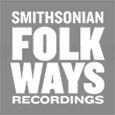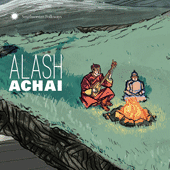

Smithsonian Folkways, 2017
(independent release 2015)


Otherworldly Central Asian Ensemble Alash
Bring Their Throat-Singing Alchemy to Midtown
by delarue
26 September 2017
In the perennially popular demimonde of Tuvan throat-singing ensembles, Alash are akin to what Huun-Huur-Tu were doing in the early days before they were discovered by the ambient and techno crowds. At this point, Alash’s music is both more rustic and upbeat than their grey-sky brethren’s recent work. The trio of multi-instrumentalist/singers Bady-Dorzhu Ondar, Ayan-Ool Sam and Ayan Shirizhik also distinguish themselves with a puckish sense of humor that really comes across in their live show. Their latest album Achai is streaming at Spotify; the World Music Institute is bringing them to Merkin Concert Hall on Oct 1 at 7:30 PM for $25.
For newcomers to the genre, or those who haven’t tried throat-singing themselves (it’s not that difficult), music from the central Asian steppes is like nothing you’ve ever heard before. Flute melodies sail over clanky, trebly acoustic doshpuluur and chanzy lutes, and frequently, clicking percussion instruments made from animal bones while the singers create strange, high harmonics oscillating from the back of their throats. Some of the melodies utilize the Asian pentatonic scale, but more often than not they don’t. Alash like methodically crescendoing one-chord jams, but also tend to keep their songs on the short side. This album makes a good introduction.
The first track, For My Son, sets a super-low bass vocal melody beneath what’s essentially a brisk boogie blues guitar tune – it’s amazing how low these guys can sing. The flute-and-guitar tune Let’s Fatten the Livestock starts out with a whisper and builds to a mighty, bullish anthem, then rises and falls with a spring breeze of a flute solo.
Stark, bluegrass-ish igil two-string fiddle wafts over delicate guitar fingerpicking on the next track, Don’t Let Me Freeze, which never slides into the terror it alludes to. The briskly strolling Karachal is a launching pad for some pretty spectacular low-register vocals: unlike other groups, Alash sing actual lyrics, not just vocalese, from the stygian depths of their registers!
Mezheegei has a grimly cinematic, windswept feel punctuated by delicate guitar and flute over resonant fiddle. Only You is a spare, brooding accordion waltz. The long, slow, moody ballad Kosh-Oi and Torgalyg is the catchiest, most anthemic number here.
The Black Bird has a hypnotically galloping bounce, while My Throat the Cuckoo is a droll, catchy exercise in birdsong riffs. The album’s title track is its darkest and most atmospheric, while the final cut, Let’s Relax, is its gentlest yet most epic. There’s also a perambulating flute-and-percussion solo and a pensive, overtone-spiced atmospheric fiddle-and-vocal piece. Count this as one of the most strangely beguiling albums of recent months.
Alash Album: ACHAI
by David Kidman
Alash is a trio of musicians from Tuva, a remote area of Siberia bordering Mongolia and Kazakhstan which boasts its own independent culture. The traditional music of Tuva is unlike any other ethnic music, and pretty much unmistakable, once heard never forgotten. Although instruments are used – the bowed igil, plucked doshpuluur, blown shoor and murgu flutes, demir-xomus (a kind of jaw harp) and kengirge (large drum, often with kit accoutrements) – the principal focus of Tuvan music is throat-singing. But even that term is a kind of umbrella for five different vocal “styles”, although as many as two or three of these can be combined in performance; the most immediately identifiable of these are [kargyraa] (deeply resonant, low-register) and sygyt (overtone-drone, higher-register). It’s just possible that some readers will have some experience of a modern-day incarnation of Tuvan music through post-punk rock bands Yat-kha or Huun Huur Tu or through solo artists Radik Tülüsh or Albert Kuvezin, while a select few other musicians (e.g. David Moss of Lightgarden) have mastered the technique of overtone singing and incorporated it into their music. But by and large, Tuvan music is unexplored territory for the majority of listeners. Which is why I’m emphasising here that while it’s unusual, and can sometimes sound positively unearthly, it’s not anywhere near as inaccessible or impenetrable as it might sound. And the exceptional presentation of this Alash disc – with brilliant detailed sound and a 24-page booklet providing copious fascinating information – should enable much wider appreciation.
The clue to the rationale for this CD (Alash’s third release) lies in its title; Achai takes its name from the Tuvan word for father (more precisely, its affectionate form of dad), and can be seen as a direct tribute to a latter-day father of Tuvan music, Kongar-ool Ondar, a tireless promoter of Tuvan music both at home and abroad who founded and led the Center for Traditional Tuvan Culture & Crafts in the Tuvan capital city of Kyzyl; tragically, he died in 2013; the members of Alash had all been under Kongar-ool Ondar’s tutelage. This CD deliberately comes full circle from a song where a father addresses his son (Oglimga) to one where the son addresses his father (Achai), Between those points, we encounter songs that reflect the nomadic nature of the Tuvan people and the harsh lives they lead, the feudal class system, and the geography of their native region (here treated anthropomorphically in a song concerning two rivers). There’s also an example of the Tuvan brand of “country music”, Kara Kush, which deals with the concerns and cares of everyday human life – and horses – and a competition song (My Throat, The Cuckoo) that compares the singer’s voice to the sounds of morning birds.
Alash also take Tuvan music forward, in one sense (on Let’s Relax) creating “a sonic landscape that grows, changes and evolves over the course of the piece”, while on two shorter pieces developing their own vision of the evolving tradition by adventurously incorporating a beatboxer alongside the murgu or the bayan (accordion). But it’s still the wonderful throat singing that provides the core signature on the disc’s 13 tracks – that sharply precise, deep-throat guttural (a bit like a more deliberately focused Tom Waits sound is the closest, but in the end probably inadequate, description). It doesn’t matter that you won’t understand the words being sung, for as a matter of interest there are at least two tracks which could otherwise almost have come from a blues or roots album by an American artist – opener Oglumga, written by legendary Tuvan musician Alexander Sarzhat-ool, and the above-mentioned Kara Kush (a setting of a poem by Sayan Mongush) creatively blend old and new sounds (and even contain hints of Malian guitar playing in their accompaniment). But the most concentrated demonstration of the different styles of throat singing comes on Ayan-ool Sam’s outstanding solo performance of the traditional piece plainly and somewhat misleadingly titled Igil/Xöömei.
This is a really stimulating musical experience – sure, not for the faint-hearted perhaps, but one I find tremendously addictive. Open-eared readers will, I’m sure, not regret making its acquaintance – so be brave, give it a try.
Alash – ACHAI (Smithsonian Folkways SWF 40578)
by Dai Jeffries
3 January 2018
For the geographically challenged – and I include myself – the Tuvan Republic is an independent area of Siberia bordering Mongolia and Kazakhstan. Its traditional music is based around throat singing with stringed or blown instruments and percussion and Alash are a trio of musicians: Ayan Shirizhik, Bady-Dorzhu Ondar, and Ayan-ool Sam. Achai is dedicated to Kongar-ool Ondar, regarded as the father of Tuvan music in the modern era, and is the group’s third album.
Now, I know what you’re thinking: he’s finally lost it, but wait. Firstly, Achai is very entertaining and secondly, the music doesn’t exist in isolation. Alash have travelled widely and absorbed much. You could replace the words of the opener, ‘Oglumba’, with American lyrics and a have a perfectly serviceable blues. Later, they are joined by a beatboxer from Baltimore who manages to capture something of the feeling of throat singing blending with Shirizhik’s flute and Ondar’s accordion.
Tuvan throat-singing is a complex subject. It consists of five styles but they are difficult to pick out as some present as drones while ezengileer sounds like soft percussion and the styles can be combined. Easier to identify is [kargyraa], a deep, resonant sound that is Ondar’s forte. He can sound a bit like Tom Waits at his most incomprehensible but with a much cleaner, crisper sound. Actually, that really doesn’t do him justice but it’s as close as I can get. Sam’s solo ‘Igil/Xöömei’ is an extraordinary mixture of techniques and the trio mix it up further on ‘My Throat, The Cuckoo’.
The vocals contrast with the delicate flutes made from natural materials easily found in the forests and the plains and the rolling string drones reminiscent of some African guitarists – Ali Farka Touré springs to mind. Words are inadequate to describe Alash’s sound – you really have to hear it for yourself.